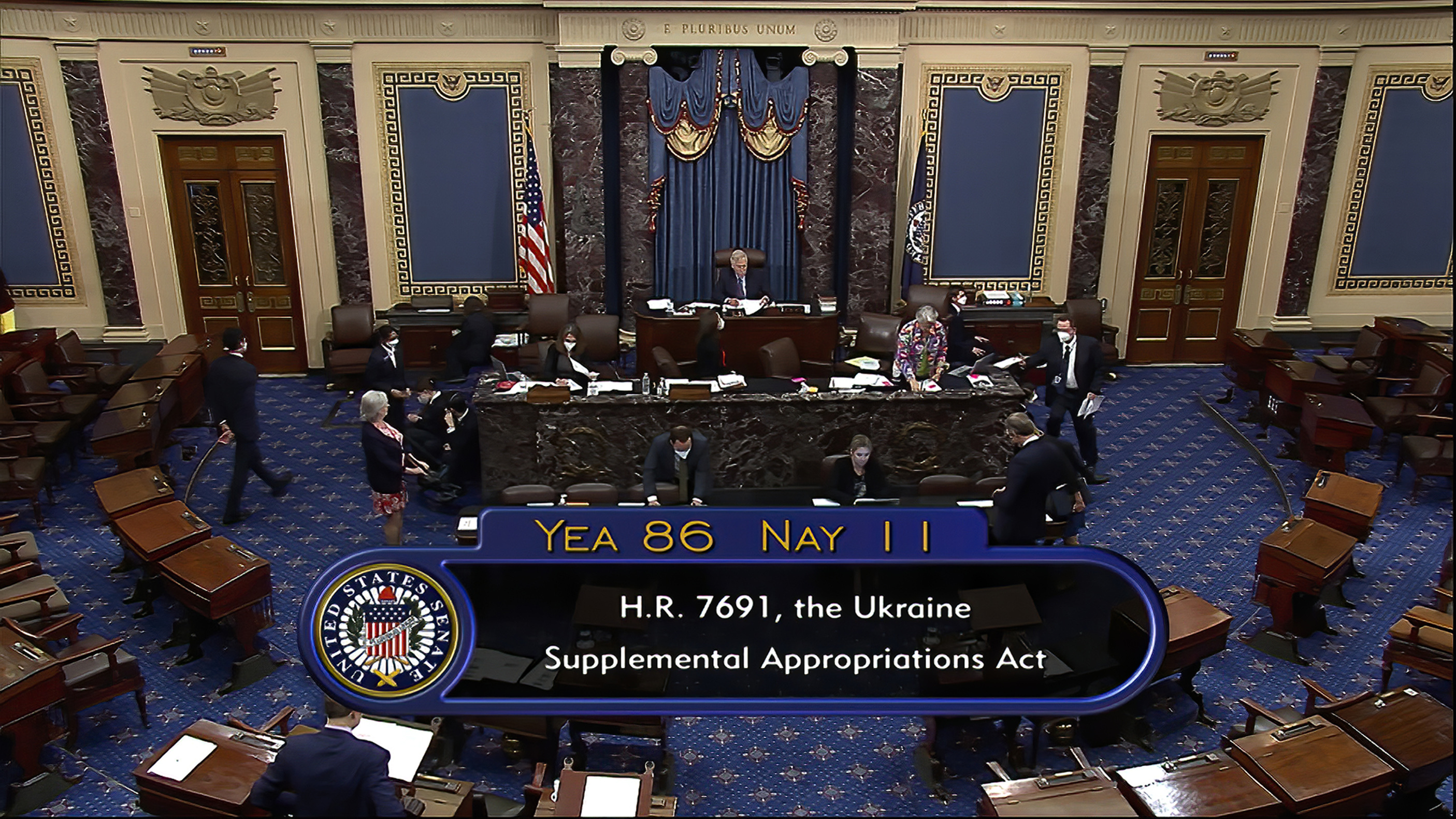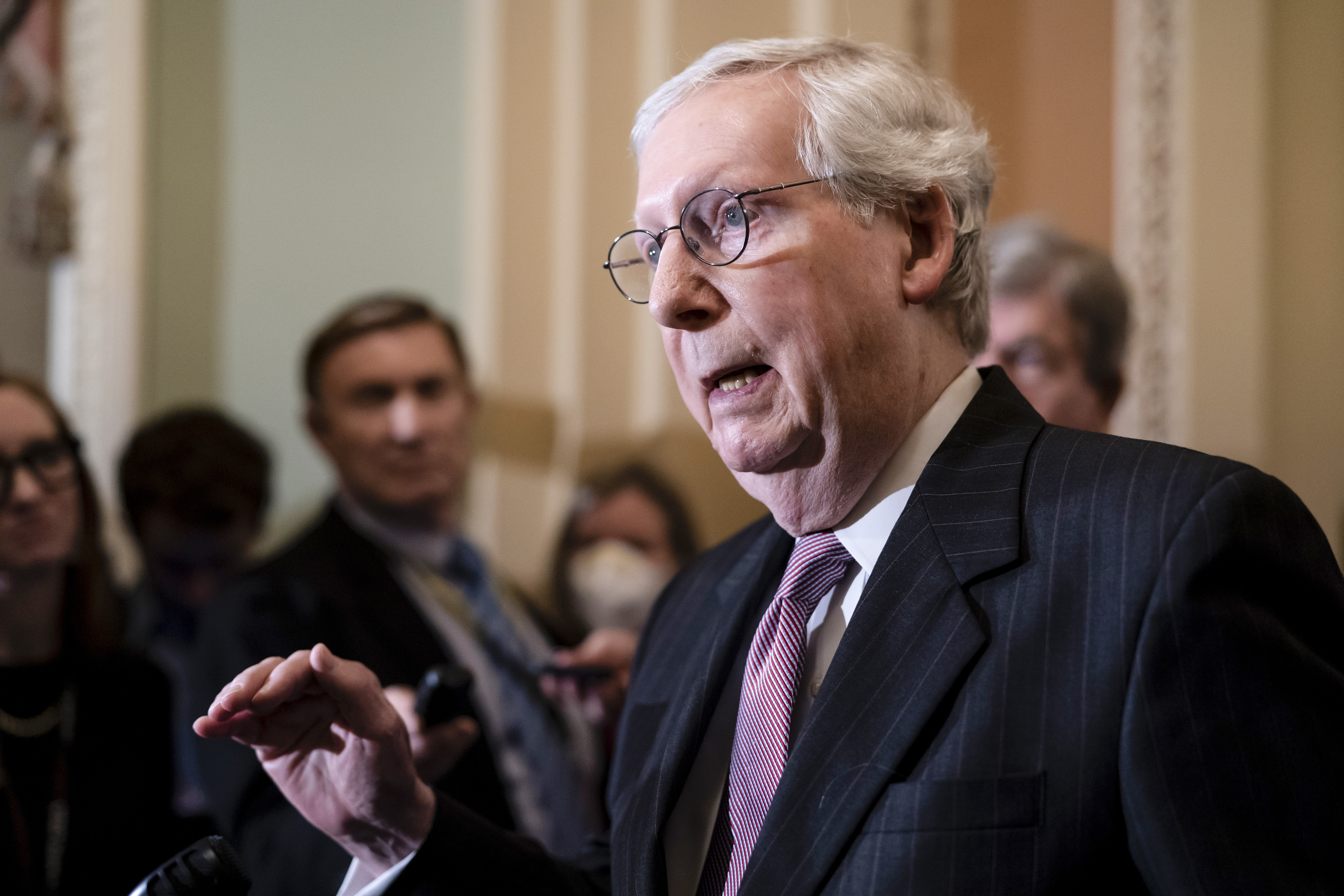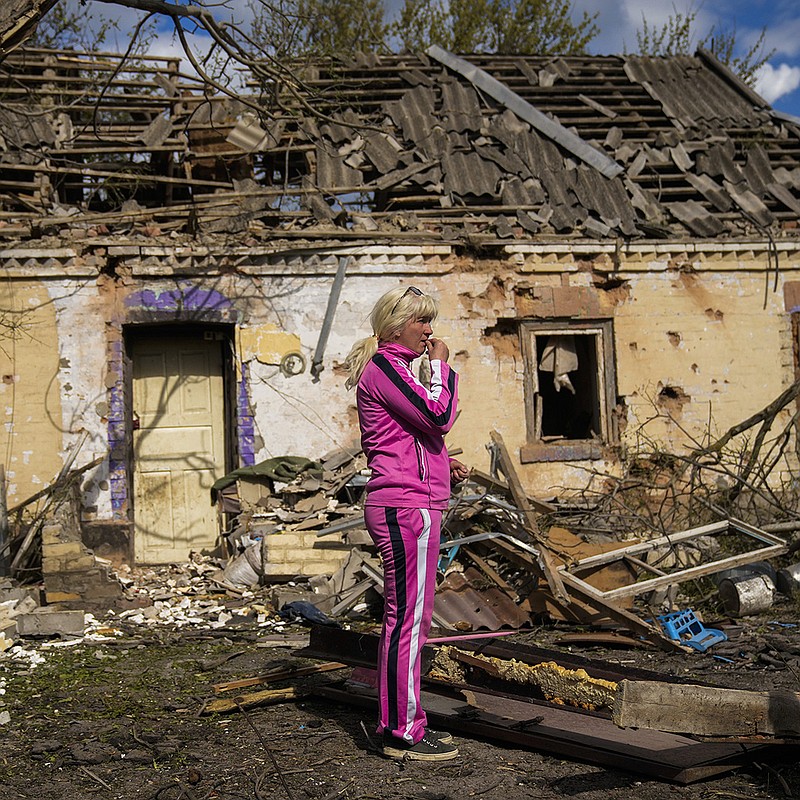WASHINGTON -- The Senate advanced a $40 billion package of military, economic and food aid for Ukraine and U.S. allies to final congressional approval Thursday, putting a bipartisan stamp on America's biggest commitment yet to turning Russia's invasion into a quagmire for Moscow.
The legislation, approved 86-11, was backed by every voting Democrat and most Republicans. While many issues under President Joe Biden have collapsed under party-line gridlock, Thursday's lopsided vote signaled that both parties were largely unified about sending Ukraine the materiel it needs to fend off Russian President Vladimir Putin's more numerous forces.
"I applaud the Congress for sending a clear bipartisan message to the world that the people of the United States stand together with the brave people of Ukraine as they defend their democracy and freedom," Biden said in a written statement.
Ukrainian President Volodymyr Zelenskyy thanked the United States. "This is a demonstration of strong leadership and a necessary contribution to our common defense of freedom," he said in his nightly video address to the nation.
With control of Congress at stake in elections less than six months off, all "no" votes came from Republicans. The same thing happened earlier this month in a 368-57 House vote, fueling campaign-season Democratic warnings that a nationalist wing of the GOP was in the thrall of former President Donald Trump and his isolationist, America First preferences.
Senate Majority Leader Charles Schumer, D-N.Y., called it "beyond troubling" that Republicans were opposing the Ukraine assistance. "It appears more and more that MAGA Republicans are on the same soft-on-Putin playbook that we saw used by former President Trump," said Schumer, using the Make America Great Again acronym Democrats are using to cast Republicans as extremists.
Senate Minority Leader Mitch McConnell, R-Ky., a strong backer of the measure, warned his GOP colleagues that a Russian victory would move hostile forces ever closer to the borders of crucial European trading partners. That would prompt higher American defense spending and tempt China and other countries with territorial ambitions to test U.S. resolve, he said.
"The most expensive and painful thing America could possibly do in the long run would be to stop investing in sovereignty, stability and deterrence before it's too late," McConnell said.
Passage came as Secretary of State Antony Blinken said the U.S. had drawn down another $100 million worth of Pentagon weapons and equipment to ship to Kyiv, bringing total U.S. materiel sent there since the invasion began to $3.9 billion. He and other administration officials had warned that authority would be depleted by Thursday, but the new legislation will replenish the amount available by more than $8 billion.
Overall, around $24 billion in the measure is for arming and equipping Ukrainian forces, helping them finance weapons purchases, replacing U.S. equipment dispatched to the theater and paying for American troops deployed in nearby countries.
There is also $9 billion to keep Ukraine's government afloat and $5 billion to feed countries around the globe reliant on Ukraine's now diminished crop yields. And there is money to help Ukrainian refugees in the U.S., seize Russian oligarchs' assets, reopen the U.S. Embassy in Kyiv and prosecute Russian war crimes.
The measure, which officials have said is designed to last through September, tripled the size of the initial $13.6 billion in Ukraine aid that lawmakers approved shortly after the February invasion.
The combined $54 billion price tag exceeds what the U.S. has spent annually on all its military and economic foreign assistance in recent years, and approaches Russia's yearly military budget.
"Help is on the way, really significant help. Help that could make sure that the Ukrainians are victorious," said Schumer.
If the war drags on, the U.S. may have to eventually decide whether to spend more even as inflation, huge federal deficits and a potential recession loom. Under those circumstances, winning bipartisan approval of any future aid bill could become tougher, especially as November draws near and cooperation between the parties frays.
Several potential 2024 GOP presidential contenders voted for the measure, including Sens. Ted Cruz of Texas, Tom Cotton of Arkansas and Marco Rubio of Florida. Another -- Josh Hawley of Missouri -- voted no. Ron Johnson of Wisconsin and Lisa Murkowski of Alaska, who perhaps face this fall's toughest reelection races among GOP senators, backed the measure.
Three Democratic senators missed the vote.
Biden had proposed a $33 billion plan that lawmakers bolstered with added defense and humanitarian spending. He had to drop his request to include $22.5 billion more to fuel the government's continued fight against the pandemic, spending that was opposed by many Republicans and got entwined in a politically complicating fight over immigration.
"I wonder if Americans across our country would agree if they had been shown the costs, if they had been asked to pay for it," said Sen. Rand Paul, R-Ky., who was among the 11 conservatives who voted "no." "We simply borrow it. 'Put it on my tab' is what Congress says."
Paul, who often opposes U.S. intervention and makes a habit of derailing bills on the brink of approval, had used Senate procedures to upend Schumer's and McConnell's plans to approve the Ukraine assistance last week.
As expected, U.S. Sen. John Boozman, an Arkansas Republican, voted against the aid legislation on Thursday while Cotton, the state's other Republican senator, voted in favor of the bill.
Earlier this week, after casting votes against advancing the measure, Boozman issued a statement saying he could not support the package. In part, he cited a "lack of oversight of U.S. taxpayer dollars" and Biden's "disastrous policies on domestic and international fronts."
Cotton, a political ally to Boozman, said in a statement at the time that the legislation is needed to help Ukraine stop the Russian invasion.
G-7 PLANS TO HELP
Top economic officials from the world's advanced economies moved closer toward agreement on a global rescue package for Ukraine on Thursday, with finance leaders negotiating the details of a multibillion-dollar plan to keep the Ukrainian government operating amid Russia's onslaught.
Finance ministers of the Group of 7 nations expressed optimism about the emergency financing deal on the first day of a two-day summit, where they are focused on how to provide aid to Ukraine and exert pressure on Russia while avoiding economic blowback that will slow the global economy. Officials have been consumed with how to contain rising food and energy prices that have some economists worrying about a global recession.
Treasury Secretary Janet Yellen said at the end of the first day of meetings that the G-7 was prepared to spend what is necessary to help Ukraine.
"There were general expressions of support," Yellen said. "All of us pledged to do what's necessary to fill in the gap." She added: "The message was: 'We stand behind Ukraine. We're going to give them the resources they need to get through this.'"
European Union officials said this weekthat they were prepared to contribute about $9.5 billion in economic assistance loans to Ukraine but that the nations within the EU would need to provide guarantees to back the program.
"We have to secure the liquidity of the Ukrainian state," German Finance Minister Christian Lindner said as the meetings convened. "We feel responsible for the capability of the Ukrainian state and its people to defend themselves."
The International Monetary Fund and Ukrainian officials have said the country needs $5 billion per month to continue paying government salaries and pensions and to cover other expenses.
The terms of the aid package were a central topic of discussion at the meetings this week. Treasury Department officials have been encouraging their counterparts to offer grants to Ukraine instead of loans and are pushing for any loan terms to be as favorable as possible.
"I am getting more optimistic," IMF Managing Director Kristalina Georgieva said on the sidelines of the G-7 meetings, referring to the plan to fill Ukraine's financial gap. "The issue will be the timing."
Ukrainian Prime Minister Denys Shmyhal joined the meeting remotely and said afterward that they discussed "practical steps" to help Ukraine recover from the war.
"Despite Russia's efforts to destroy our economy, together we will win!" Shmyhal said on Twitter.
U.S. TARGETS RUSSIAN OIL
Meanwhile, the Biden administration is developing plans to further choke Russia's oil revenues with the long-term goal of destroying the country's central role in the global energy economy, current and former U.S. officials say, a major escalatory step that could put the United States in political conflict with China, India, Turkey and other nations that buy Russian oil.
The proposed measures include imposing a price cap on Russian oil, backed by so-called secondary sanctions, which would punish foreign buyers that do not comply with U.S. restrictions by blocking them from doing business with American companies and those of partner nations.
As Putin wages war in Ukraine, the United States and its allies have imposed sanctions on Russia that have battered its economy. But the nearly $20 billion per month that Russia continues to reap from oil sales could sustain the sort of conflict under way in eastern Ukraine and finance any future aggressions, according to officials and experts.
U.S. officials say the main question now is how to starve Moscow of that money while ensuring that global oil supplies do not drop, which could lead to a rise in prices that benefits Putin and worsens inflation in the United States and elsewhere. As U.S. elections loom, Biden has said a top priority is dealing with inflation.
While U.S. officials say they do not want to immediately take large amounts of Russian oil off the market, they are trying to push countries to wean themselves off those imports in the coming months. A U.S. ban on sales of critical technologies to Russia is partly aimed at crippling its oil companies over many years. U.S. officials say the market will eventually adjust as the Russian industry fades.
Russia's oil industry is already under pressure. The United States banned Russian oil imports in March, and the European Union hopes to announce a similar measure soon. Its foreign ministers discussed a potential embargo in Brussels on Monday. The Group of 7 industrialized nations agreed this month to gradually phase out Russian oil imports.
"It's not going to end overnight, but Europe is clearly on track to move decisively in that direction," Blinken said in Berlin on Sunday when asked about future energy sanctions at a NATO news conference.
Speaking in Bonn on Thursday, Yellen, the U.S. Treasury secretary, said she and her foreign counterparts had discussed options for shrinking Russian oil revenue outside of a full European embargo.
"The objective is to keep some Russian oil flowing to the market to hold down global prices so we don't have undue negative impacts on third countries," Yellen told reporters.
Yellen pointed to price caps, tariffs and secondary sanctions as possible ways of reducing Russia's oil revenue without sending prices soaring globally.
Russian oil exports increased in April, and rising prices mean that Russia has earned 50% more in revenues this year compared to the same period in 2021, according to a new report from the International Energy Agency in Paris. India and Turkey, a NATO member, have increased their purchases. South Korea is buying less but remains a major customer, as does China, which criticizes U.S. sanctions.
U.S. officials are looking at "what can be done in the more immediate term to reduce the revenues that the Kremlin is generating from selling oil, and make sure countries outside the sanctions coalition, like China and India, don't undercut the sanctions by just buying more oil," said Edward Fishman, who oversaw sanctions policy at the State Department after Russia annexed Crimea in 2014.
The Biden administration is looking at various types of secondary sanctions and has yet to settle on a definite course of action, according to the officials.
"If we're talking about Rubicons to cross, I think the biggest one is the secondary sanctions piece," said Richard Nephew, a scholar at Columbia University who was a senior official on sanctions in the Obama and Biden administrations. "That means we tell other countries: If you do business with Russia, you can't do business with the U.S."
Information for this article was compiled by Alan Fram of The Associated Press; by Alan Rappeport, Edward Wong and Michael Crowley of The New York Times; and by Ryan Tarinelli of the Arkansas Democrat-Gazette.
 This image from Senate Television video shows the final vote of 86-11 as the Senate overwhelmingly approved a $40 billion infusion of military and economic aid for Ukraine and its allies on Thursday, May 19, 2022, in Washington, as both parties rallied behind America's latest, and quite possibly not last, financial salvo against Russia's invasion. (Senate Television via AP)
This image from Senate Television video shows the final vote of 86-11 as the Senate overwhelmingly approved a $40 billion infusion of military and economic aid for Ukraine and its allies on Thursday, May 19, 2022, in Washington, as both parties rallied behind America's latest, and quite possibly not last, financial salvo against Russia's invasion. (Senate Television via AP) FILE - Senate Minority Leader Mitch McConnell, R-Ky., speaks to reporters ahead of a procedural vote on Wednesday to essentially codify Roe v. Wade, at the Capitol in Washington, Tuesday, May 10, 2022. McConnell and a delegation of GOP senators met with Ukrainian President Volodymyr Zelenskyy in Kyiv during an unannounced visit Saturday, May 14, delivering the latest show of American support for the country in its war with Russia. A video posted on Zelenskyy’s Telegram account showed McConnell, R-Ky., and Sens. Susan Collins of Maine, John Barrasso of Wyoming and John Cornyn of Texas greeting him in the capital. (AP Photo/J. Scott Applewhite, File)
FILE - Senate Minority Leader Mitch McConnell, R-Ky., speaks to reporters ahead of a procedural vote on Wednesday to essentially codify Roe v. Wade, at the Capitol in Washington, Tuesday, May 10, 2022. McConnell and a delegation of GOP senators met with Ukrainian President Volodymyr Zelenskyy in Kyiv during an unannounced visit Saturday, May 14, delivering the latest show of American support for the country in its war with Russia. A video posted on Zelenskyy’s Telegram account showed McConnell, R-Ky., and Sens. Susan Collins of Maine, John Barrasso of Wyoming and John Cornyn of Texas greeting him in the capital. (AP Photo/J. Scott Applewhite, File)Gallery: Images from Ukraine, month 3


